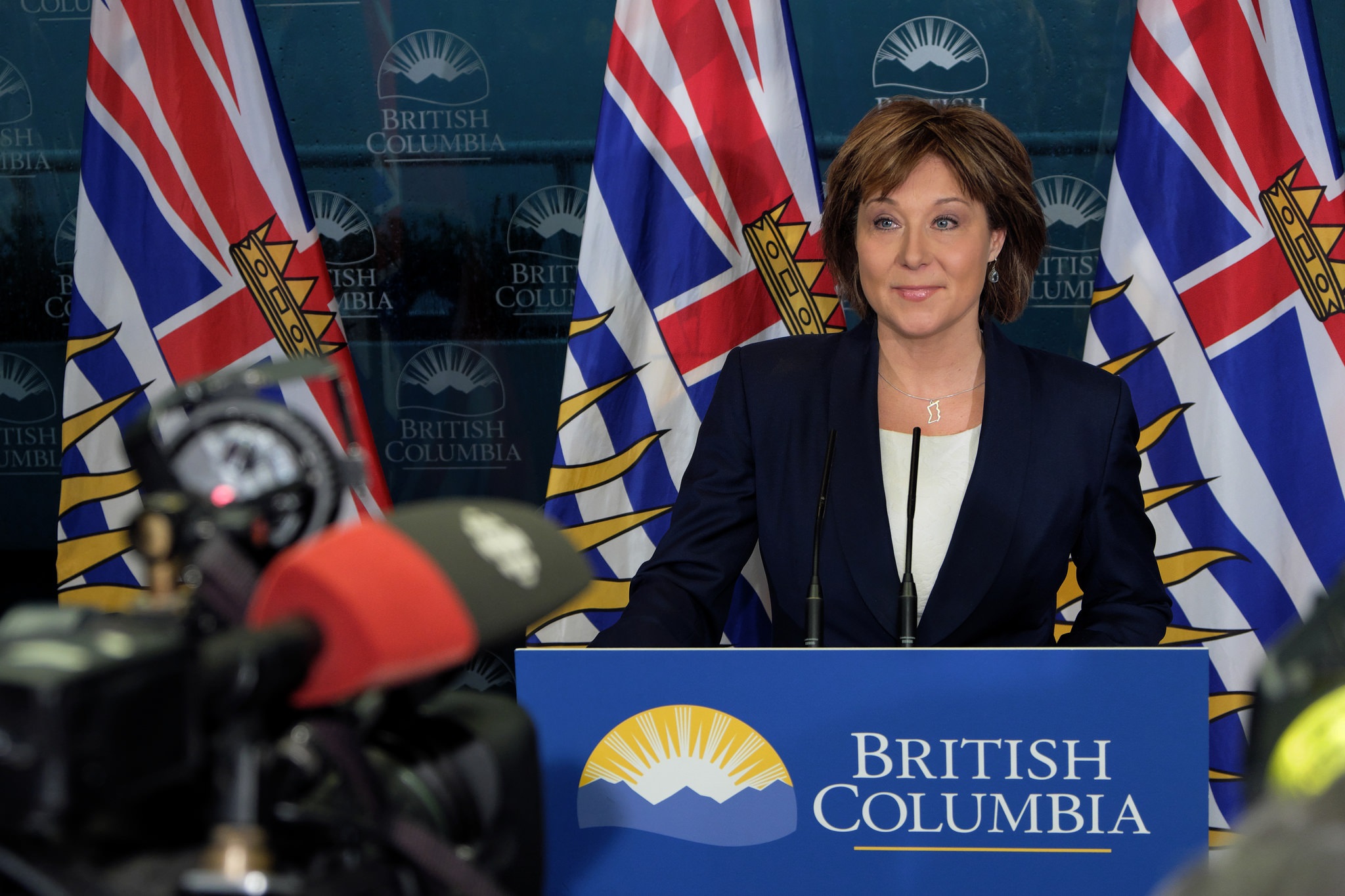British Columbia Premier Christy Clark said the plan to triple the capacity of a pipeline that carries oil from Alberta’s tar sands through B.C. for export has almost met the five conditions necessary to win her government’s support.
“Almost all the conditions have been met and significant progress has been made on all of them,” Clark said in a news conference the morning after Prime Minister Justin Trudeau announced federal approval of Kinder Morgan’s plan to twin its Trans Mountain pipeline between Edmonton, Alberta and Burnaby, B.C.
Trudeau’s announcement, welcomed by the government of Alberta and representatives of the oil and gas industry, sparked a protest of hundreds in downtown Vancouver Tuesday night and an outpouring of criticism from B.C. opposition parties, municipal leaders, environmental organizations and several First Nations groups, including the Union of B.C. Indian Chiefs.
“We’ve said that these conditions are a path to get to ‘yes’ for any project from Alberta that’s proposed and that would move through British Columbia,” Clark said. “Today I should say we are very pleased with the progress we have made, that these projects have made, and the federal government has made in ensuring they meet the five conditions.”
Those conditions, first announced in 2012, are:
- Successful completion of the environmental review process;
- World-leading marine oil spill response, prevention and recovery systems for B.C.’s coastline and ocean to manage and mitigate the risks and costs of heavy oil pipelines and shipments;
- World-leading practices for land oil spill prevention, response and recovery systems to manage and mitigate the risks and costs of heavy oil pipelines;
- Legal requirements regarding Aboriginal and treaty rights are addressed, and First Nations are provided with the opportunities, information and resources necessary to participate in and benefit from a heavy-oil project; and
- British Columbia receives a fair share of the fiscal and economic benefits of a proposed heavy oil project that reflects the level, degree and nature of the risk borne by the province, the environment and taxpayers.
Clark said that for the Trans Mountain project, all but two of the conditions have been met.
Concern about marine spill response remains, Clark said. “We still need some details on the ocean protection plan and we’re still working through that with the federal government so we can be absolutely certain that our coast is protected.”
Also, while there would be some jobs during construction of the pipeline, “We still need to work out some details to make sure that British Columbia is getting its fair share of the jobs and the economic benefits of this project,” Clark said.
“In terms of the other areas, that work is done,” she said.
Agreements and opposition
John Horgan, the leader of the BC NDP, said Clark appears to be in support of the project even though her five conditions clearly have not been met.
“I think Christy Clark has wanted this pipeline all along,” he said. “Christy Clark and the BC Liberals need to stand up for British Columbians, and they are not doing that today.”
Horgan criticized Clark for signing over B.C.’s decision-making authority on the project to the federal government.
And he said Clark should be more careful in her claim that the project has addressed Aboriginal and treaty rights. “Certainly not consistent with the language I’ve been hearing from the Tsleil-Waututh and other First Nations here in the Burrard Inlet,” he said.
“I know there are agreements in place with other First Nations, but there [is] also hostile opposition as you go through the corridor to the Alberta border,” Horgan said. “I think the premier misspoke or mischaracterized, as she’s often wont to do, where First Nations people are on these issues.”
The CBC reported that as of last week Kinder Morgan said it had letters from 39 of the 120 Aboriginal groups it had consulted about the Trans Mountain project.
The Tsleil-Waututh Nation has been vocal in its opposition to the proposal, as has Grand Chief Stewart Philip, president of the Union of B.C. Indian Chiefs.
Election issue
Horgan said he expects the pipeline expansion will be an issue in the provincial election scheduled for May 9, 2017.
“Kinder Morgan is a divisive issue in British Columbia, and it’s one I’m going to be focusing on, but there are many, many other things we need to be talking about and I’ll be talking about them,” Horgan said.
“It will be an election issue, but there are many, many other issues that are critically important to British Columbians and I don’t want to lose sight of that in November as we lead up to an election in May.”
Those issues include affordability, public education, the erosion of public health care, seniors issues and overdose deaths, he said, vowing to hold Clark accountable for decisions made during the 15 years the BC Liberals have been in government.
Clark said she thinks voters will recognize her government has been consistent on its approach to pipeline projects. “I believe that we have to find ways to balance resource development and job creation in this country with environmental protection, and I don’t think there is anywhere in the world that does it as well as we do here in B.C.,” she said. ![]()

















Tyee Commenting Guidelines
Comments that violate guidelines risk being deleted, and violations may result in a temporary or permanent user ban. Maintain the spirit of good conversation to stay in the discussion.
*Please note The Tyee is not a forum for spreading misinformation about COVID-19, denying its existence or minimizing its risk to public health.
Do:
Do not: